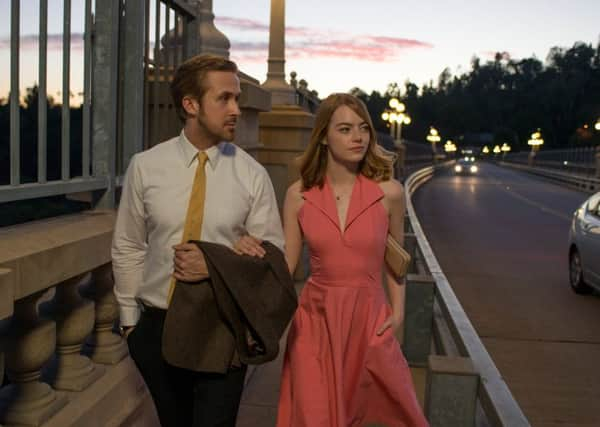Venice Film Festival review: La La Land | Arrival | Light Between Oceans


The new film from Damien Chazelle, the director of the Oscar-winning Whiplash, is a lush, vibrant, nostalgia-soaked celebration of Hollywood musicals of the 40s and 50s that leaps off the screen in a riot of high-contrast colour, music and movement. Opening with a high-energy, one-shot song and dance routine, set, incongruously, during an early morning traffic jam, the film brings together Seb (Ryan Gosling) and Mia (Emma Stone), who dream of opening a traditional jazz club and breaking into the movies, respectively. As they fall in love and follow their passions, the question arises: Can they have their dreams and each other?
Where Whiplash was all terse, syncopated rhythms and edge of the seat confrontations, La La Land is broad and expansive, a joyful, melancholy-tinged romp around a romanticized version of the town where people come to pursue their dreams, sometimes succeeding, sometimes falling into despair. Gosling and Stone lend their conflicted characters warmth, humour, depth and expressive singing voices, in a film that isn’t afraid to mix the bitter with the sweet, along with the razzle dazzle. Expect La La Land to feature prominently come awards season.
Advertisement
Hide AdAfter exciting people with its mysterious trailer, Denis Villeneuve’s Arrival (****) proves to be the kind of thoughtful, weird, gripping science fiction movie that you’d expect from the director of Prisoners and Sicario. Intelligently adapted from Ted Chiang’s acclaimed short story, Story of Your Life, by Eric Heisserer, the film casts multi-Oscar nominated Amy Adams (the beating heart of the film) as Louise Banks, a respected linguist who is drafted in by the US military when alien craft that look like huge, hovering coffee beans, appear in locations around the world. Louise, aided by mathematician Ian Donnelly (Jeremy Renner), is tasked with finding a way to communicate with the aliens in an attempt to discover whether they come in peace, or have more hostile motives. Meanwhile the world is sliding into chaos and the precarious multi-national coalition formed to solve the problem is coming dangerously close to collapsing, as some countries move toward war-war rather than jaw-jaw. Amidst this global event, Louise finds herself assailed by memories of her dead daughter which may hold the key to unlocking the answers she’s desperately seeking. Villeneuve’s approach is immersive and unhurried, at times recalling Spielberg and Kubrick and even the final shot of his own film Enemy, while Louise’s family story, told in scenes that wouldn’t look out of place in Terrence Malick’s Tree of Life, achieves the feat of being simultaneously heartbreaking and life-affirming.
Intelligent mainstream science fiction films that deal with ideas as well as offering spectacle are thin on the ground, so Arrival – which does both, along with delivering a knockout emotional punch – is one to cherish. You may need to see it more than once to fully appreciate the intricacy of its storytelling, however.
An acclaimed director with a forensic knowledge of relationships, Derek Cianfrance (Blue Valentine), two of the best actors working today, Michael Fassbender and Alicia Vikander, and a stunning, elemental location, should have been fail-safe ingredients for a gripping romantic drama, but The Light Between Oceans (***) never quite ignites. Fassbender plays Tom, an emotionally and psychologically scarred WW1 veteran who takes up the post of a lighthouse keeper in Australia. A brief meeting with a young woman (Vikander) leads to love and marriage. She sinks into despair when their attempts to have children fail. But then fate sends them a baby in a washed-up rowing boat, along with its dead father, and she sees a way to fill the gap. Tom reluctantly agrees to keep the child, but years later a chance encounter threatens to undo their happiness. The themes of guilt, forgiveness, love, loyalty and redemption weave interestingly through the film, while Vikander and Fassbender (who became a couple off screen) have strong chemistry. Ultimately, though, schematic plotting, thinly drawn characters and soapy plotting mean The Light Between Oceans falls short of its heart-rending possibilities, despite buckets of onscreen tears.
If you thought 3D was just for big spectaculars, think again. Wim Wenders’ Les Beaux Jours d’Aranjuez (**) is a chamber-piece set in a Chekhovian French country garden, on a timeless Summer’s day, and mainly comprises a man and a woman talking about sex, love, relationships and summers past, in purple language. Nick Cave provides a brief interlude performing the beautiful Into My Arms, and Lou Reed’s Perfect Day, played over shots of empty Paris locations, creates a haunting opening. It is all rather baffling, though. The film seems to be about the desire to escape from the cacophony and cheapening effects of modernity, but I can’t be certain.